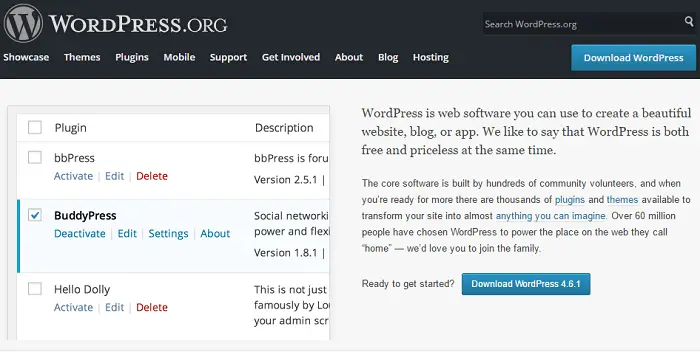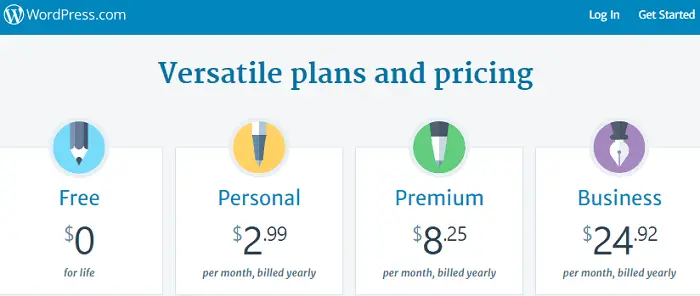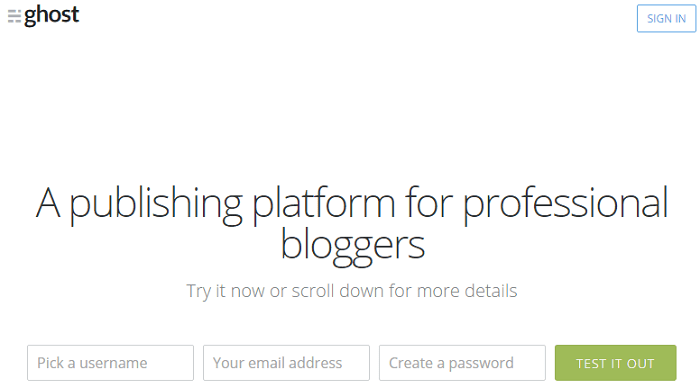Disclaimer: This post may contain affiliate links, meaning we get a small commission if you make a purchase through our links, at no cost to you. For more information, please visit our Disclaimer Page.
Nowadays, blogging has become very popular. It’s an exciting and engaging online activity. Many people are planning to start blogging for different purposes. However, you will need a proper plan to start a successful blog.
The first decision you have to make is to select the right blogging platform that will suit your needs perfectly. There are so many options to choose. Therefore, you need to be careful when choosing the platform for your blog.
Read Article: 5 Security Questions You Have To Ask To Secure Your Computer
Table of Contents
What are the features of a good blogging platform?
The first step is to clearly spell out what you expect to gain from a blogging platform. Another factor that will influence your choice is your level of knowledge when using a computer. For new bloggers, the best choice is to select a platform that is easy to understand and use. Some important factors to consider are choosing the platform that will be flexible to accommodate any changes as well as create an opportunity to commercialize your blog later.
In this article, I will show you some good blogging platforms, as well as point out the pros and cons of each. The following list contains ten popular blogging platforms which will help you to choose the best blogging platform that suits your situation.
1. WordPress.org
WordPress.org is one of the most popular blogging platforms with reliable software. Its software operates from an open source that allows users to build and develop their own websites and blogs to a particular taste.
Pros:
- Every user has control over the different features of their blog.
- Users can develop their blogs to include more interesting and engaging features like forums, membership options, and commercial activities.
- They also can make their blogs stand out with the use of amazing themes available on this blogging platform.
- Users have access to over 45,000 plugins. These are apps that are used to develop better features.
- Your blog will enjoy good attention online because WordPress.org ranks well with the popular search engines.
Cons:
- Users are exposed to making mistakes because they will be learning while developing the blog for the first time.
- Users are responsible for their storage, backup, and online security.
Price:
Everyone can have free access to WordPress.org after securing a domain name. A domain name will cost around $14 per year – sometimes cheaper.
In addition, you have to pay for a web hosting fee. Typically, it costs around $1 per month. However, these prices vary among the different providers. To find out further about domain names and web hosting services, read suggestion posts below.
A few interesting articles you might like:
- Top 10 eCommerce Web Hosting Companies You Need To Know
- 10 Best Web Hosting Services For Your Websites And Blogs
- Top 10 Best Domain Registrars You Should Know
2. WordPress.com
WordPress.com was established by Matt Mullenweg, a co-founder of WordPress.org. Clients have the opportunity to set up their blogs free of charge. This service comes with essential features. Payment must be made to get additional features like increased storage, security, and a custom domain name that will improve the blog.
Pros:
- It’s easy and ready to use without any extra setup.
- Clients will find it easy to manage their blogs.
Cons:
- There are few options to develop the blog.
- Clients cannot make extra money from selling spaces to interested advertisers.
- com has the authority to suspend activities of your blog any time they feel you have broken the rules.
Price:
The online community will enjoy available services free of charge while accommodating the WordPress.com adverts on their blogs. There is the option to take the package of $2.99/month to remove the branded WordPress.com adverts from your blog.
Many new bloggers have started off with WordPress.com and later moved on to the WordPress.org which offers more flexible services.
3. Blogger
Blogger is perfect for the amateur blogger. Google launched this free blogging platform in 2003. It offers a free blog hosting service that is easy to understand and use.
Pros:
- It’s free for every interested user.
- This blogging platform is perfect for amateurs with no previous blogging experience.
- Blogger platform is runn and maintained by Google – a reliable company.
- It’s secure, with a fee HTTPS provided for users.
Cons:
- There is restricted allowance for more features.
- Low quality templates with limited options to choose from.
- Users will be stuck with old looking features for a long time.
- Users can lose access to their blogs without warning from Google.
There is always the option of upgrading your blog to a better service when you feel the need to do this.
4. Tumblr
Tumblr has a different kind of offer for blogging. It gives account owners the opportunity to operate a microblog with social networking. Users can also share their content on other blogs to get a wider audience.
Pros:
- Anybody can use Tumblr free of charge.
- The advantage of having social media features is a plus.
- It is quick and easy to include videos and small sized media content in your blogs posts.
Cons:
- Some restrictions limit further development of your blog.
- The available themes do not add any significant value to your blog.
- Users face some limitations when it comes to backing up their data or moving files across platforms.
Price:
Tumblr is free; all you have to do is create your account.
5. Weebly
Weebly is another excellent blogging platform that I would recommend for new bloggers. On this platform, you can use the drag and drop features to develop your blog. There are many options you can use to create a perfect blog the way you want.
Pros:
- Using Weebly is easy. Amateurs will find it easy to build their blogs.
- Users will enjoy free hosting for their blogs.
- Weebly offers new users a free trial before they make the decision to buy a plan.
Cons:
- Account owners will work under some restrictions as the available features cannot be altered or developed further.
- The apps are not compatible with third party platforms.
- Migration from Weebly is quite difficult.
Price:
Weebly offers two packages. The first package is a basic plan; it costs $8.00/month with limited features. The second package costs $49.00/month with access to all the awesome features of this blogging platform.
6. Wix
This is another good blogging platform that offers blog hosting too. It is a good choice for startups that need a blog to create their own online community. Users can take advantage of the unique drag and drop tools to build and develop their blogs. There is also the Wix blog app which is user-friendly as well.
Pros:
- Account owners can develop their blogs to unique and particular tastes for more appeal.
- Amateurs will not need any technical skills to work on this platform.
- It is easy to use and reliable.
Cons:
- The free accounts have restrictions on some features.
- Incompatibility with third party apps.
- There are strict rules for selection and use of templates.
- Users do not have access to get external advertisements on their blogs.
Price:
Account owners will have access to the basic package at no cost. The price of the premium package is $8.50/month; clients can pay as much as $24.50/month to enjoy extra benefits.
7. Medium
The popularity of Medium has grown since its formation in 2012. Medium.com has grown into an active hub for bloggers, writers, and freelancers. It is easy to use and reliable.
Pros:
- It is easy to use requiring no technical or coding knowledge.
- There is an already growing online community from where users can learn new skills.
- A new blogger can focus on their blog without any distractions.
Cons:
- The available features are limited; this can frustrate an ambitious
- Medium controls your blogging activities.
- There are restrictions preventing users from benefiting from personally sourced advertisements.
Price:
Medium is free to use. It is a good place to start your blogging experience before moving on to better platforms that will give you more control.
8. Squarespace
New bloggers will appreciate the opportunity to create good looking blogs on this platform. The drag and drop tool is available to develop a fantastic blog. Startups can use this service to launch their first online presence.
Pros:
- Using Squarespace requires minimal skills and it is user-friendly.
- Users of this platform will have access to a beautiful selection of templates to make their blogs look very appealing.
- It has the option of providing a domain name with SSL/HTTPs.
Cons:
- Squarespace users are limited to the features that come already on the platform.
- Clients who choose to work with the personal plan will be limited to just 20 pages for their blog and only two contributors.
- There are limitations concerning compatibility with other services.
Price:
The price for the personal plan will cost a new user $16.00/month. However, there is a reduction if the client pays for a year. This will be charged at $12/month. The business plans are also available on monthly or yearly costs at $26/month or $18 if the client pays for a year.
9. Joomla
Joomla offers users a similar open source blog management system like the WordPress.org. This comes with self-hosting but requires a domain name and web hosting service to enjoy this feature on Joomla.
Pros:
- It can be used for a lot of applications and various styles of blogs.
- There are many templates to choose from that will give your blog a customized look.
- Users will have access to many important extensions for their blogs.
Cons:
- Joomla has a small online community; this means limited opportunities for new bloggers.
- Any assistance an amateur requires will need to be sourced from the online community which can be tiresome.
- Users are responsible for managing their data backups and security updates at an extra cost.
Price:
New users will need to secure a domain name at about $14.99/year and hosting at $7.99/year. With this in place, they can enjoy Joomla services free.
10. Ghost
This is another good blogging platform dedicated to bloggers who are in the business of writing blog posts. Account owners can host their blogs personally or enjoy being hosted.
Pros:
- It is for bloggers who basically write guest posts.
- Ghost has a user-friendly
- It is quick and reliable because it’s written in
- The hosted version requires no technical skills to use.
Cons:
- Clients who like customized apps will not be able to do this on the Ghost platform.
- There are limited options and applications.
- The blog might not look very appealing because of the few themes available.
- It is not easy to install if you are an amateur.
Price:
There are two categories of prices. The self-hosting version costs $14.99/year, and the web hosting version costs $7.99/month. A blog that offers a 25,000-page limit is available at $19/month.
Conclusion
All these platforms have important advantages, and they can be used as a starting point for new bloggers. WordPress.org tops the list as the best platform with its amazing features. It is also quite flexible and easy to use.
It’s important that you understand what is required to run a blog and that you know what platform will promote the kind of blog you have planned to create. The information you have gathered so far will be very useful.
Read Article: 5 Tips To Consider When You Buy A Headphone










